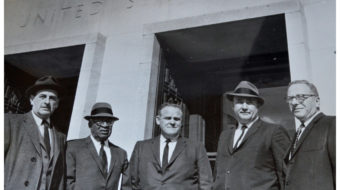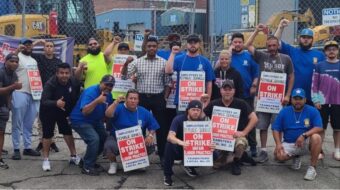
CHICAGO – Hundreds of people gathered on Tuesday afternoon at the Thompson State of Illinois Center here: Demonstrators from various organizations and alliances rallied together in the Fight for 15 action. It was a call for action from the millions of underpaid workers throughout the nation that believe they deserve more than a minimum wage. According to the official Fight for 15 Facebook page, about 2.5 million workers in Illinois make less than $15 an hour. This is partially a product of corporate greed and their inability to respect the right to organize without retaliation.
Many CEO’s make up to hundreds of thousands of dollars a year, while their workers struggle to survive from paycheck to paycheck. Some of the more vulnerable populations include fast-food employees, child-care, home care, and airport workers, adjunct professors, and students. Demonstrators chanted loudly as energy vibrated throughout the crowd:
“What do we want?”
“Fifteen!”
“When do we want it?”
“Now!”
Several organizers spoke at the rally about the significance of intersectionality in the Fight for Fifteen. Many noting that without the Black Lives Matter movement, or other affiliated organizations, there would not be the same massive following of activists. The speakers were translated into Spanish to accommodate the largely Latino presence — one that has played an essential role in the creating momentum and supporting the labor unions.
In an exclusive interview with Adriana Alvarez, 22, an official union member and advocate for the Fight for 15, I asked the million dollar question. Do you deserve a 15 dollar minimum wage?
“We do. Being a part of this movement has gotten us more already – before I started with Fight for 15, the management treated us like animals. They would scream at us and degrade us in front of people. Now they can’t. Now they actually treat us with respect. They explain something instead of yelling”
When asked if she thought that fifteen dollars an hour was too much for a standard ‘burger flipper’ to make, she elaborated,
“We all deserve a living wage. We’re working, we’re not asking for a handout. There are people who have been there for sixteen years that only make 11 dollars and hour, and that doesn’t add up.”
I inquired further with Adriana about corporate accountability, and whether these multi-billion dollar businesses could ever be trusted to pay their employees a livable wage:
“Corporations are greedy, they want to keep all the profits for themselves while forgetting about the people who actually making their money. We’re one year away from election though, we’re going to make sure that the politicians hear our voice and listen to what we asking for. We have the power, without our vote they won’t win.”
The Fight for 15 extends far beyond what some consider “entitlement.” Most individuals don’t require a degree in mathematics to understand that surviving on such a drastically low wage is nearly impossible. The National Low Income Housing Coalition released an extensive study which displayed a map showing (state by state) how no minimum wage worker can afford a one-bedroom rental unit at Fair Market Rent, working a standard 40-hour work week, without paying more than 30 percent of their income. This last year, lawmakers took it upon themselves to participate in the “Live the Wage” challenge that required them to get by on 77$ a week. What started off as an effort to prove that it was actually possible for low-income earners to survive on such a restricting budget, turned into an eye-opening experience when it became abundantly clear that $7.25 an hour isn’t enough to make ends meet.
While the congressmen could easily end their challenge and move forward with their regularly scheduled lives, the real men and women who live at the mercy of minimum wage continue their Fight for 15. As Adriana noted, the election is less than a year away and the working class has sent their message loud and clear; no person, regardless of societal status, deserves to live in poverty.
Photo: Michelle Zacarias/PW










